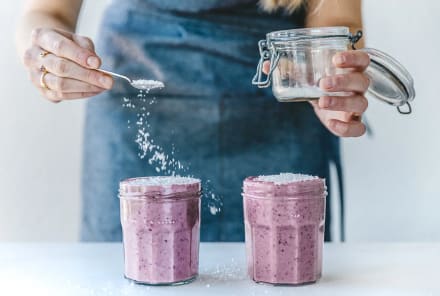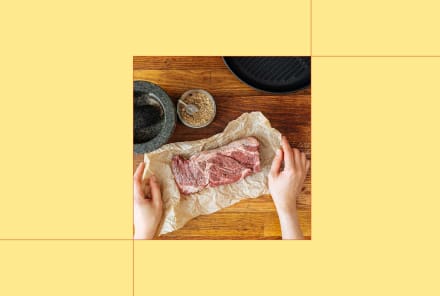Advertisement
The Small Tweak That Makes Intermittent Fasting Way More Effective For Weight Loss


Many people are familiar by now with intermittent fasting, or periods of eating and not eating.
But, you may not be familiar with the concept of IFPC: intermittent fasting protein cycling, which I coined for my book, Glow15: A Science-Based Plan to Lose Weight, Revitalize Your Skin, and Invigorate Your Life.
IFPC, the fast is 16 hours (sleeping hours included!) followed by eight hours of eating. During the eating part, you'll be protein cycling (or PC), alternating between protein restriction and normal protein intake.
Let's dive deeper into this.
This deprivation and supply of nutrient intake influences a biological process called autophagy
Autophagy comes from the Greek, auto, meaning "self," and phagy, meaning "to eat," and it's literally the way your cells self-cannibalize.
Yes, you read that right—when autophagy is working optimally, your cells eat away the junk, removing and recycling the waste that leads to the visible signs of aging.
As we get older, autophagy becomes less efficient. It needs to be boosted so that your cells can effectively eat away their own junk.
The best way to make this happen is to not provide any additional nourishment, essentially forcing your cells to self-cannibalize.
IF, or intermittent fasting, does this, as you might expect, by depriving the cells of nutrients during your fast. Specifically, it works by activating glucagon, which works in opposition to insulin to keep your blood glucose levels balanced.
Think of a seesaw: If one side goes up, the other goes down. In your body, if insulin goes up, glucagon goes down, and vice versa.
When you give your body food, insulin automatically rises and glucagon starts to decrease. But the opposite happens when you deny your body nutrients—insulin goes down, and glucagon rises.
An increase in glucagon triggers autophagy. This is why temporarily withholding nutrients, or fasting, is one of the best ways to boost the youth of your cells.
In addition, cycles of intermittent fasting have been associated with a decrease in visceral fat,1 anti-cancer properties2, immune-boosting properties3, and longevity4.
It is believed that many of these benefits of IF—like burning more fat, providing more energy, and decreasing your risk of developing certain diseases—can be attributed to the activation of autophagy.
One of the main reasons protein cycling works to enhance youth is because your body can’t create its own protein.
PC, or protein cycling, has an effect similar to fasting. Creating protein deficiency also lowers your insulin levels—it’s that seesaw again—and that, in turn, boosts your glucagon and activates autophagy.
This means your body will not store the foods you eat as fat but instead will work to build muscle and burn fat. One of the main reasons protein cycling works to enhance youth is because your body can’t create its own protein.
Instead, it is forced to find every possible way to recycle the existing protein you’ve already provided it. The problem is, we don’t normally deprive ourselves of protein. Actually, we generally eat enough protein to keep autophagy in "maintenance" mode.
On average we eat 70 grams of protein daily, which is more than one and a half times the amount typically recommended for women. But our bodies can handle periods without protein. If you think about it, this goes back to our ancestors, the hunter-gatherers who often had to survive for periods without a successful hunt.
Here's how to IFPC and kick your intermittent fasting up a notch
IFPC works to take advantage of autophagy, activating and inhibiting the process, with "low days" and "high days."
You will choose three nonconsecutive "low days" intended to help you activate autophagy by starving your cells of nutrients.
On your "low days," you will do this by fasting overnight and into the morning (for a total of 16 hours) and then limit your protein intake for the remainder of the day to less than 25 grams.
The remaining four days of the week are your "high days." On these days, there are no food restrictions. This will inhibit autophagy.
IFPC is purposely designed in this pattern of activation and inhibition. It is important because constant low days are not ideal. We can’t live in a constant state of nutrient deprivation.
Starvation is obviously unhealthy, and too much protein restriction can actually contribute to aging in the form of muscle wasting, accompanied by increasing weakness and immune deficiencies.
So to ensure you get all of the benefits of both fasting and protein restriction, the intermittent and cyclical combination of "low days" and "high days" is fundamental to the practice of IFPC.
You may choose any day of the week to be "low" or "high" (keeping in mind that the three low days should be nonconsecutive).
I prefer unrestrained eating on the weekends, so I make Monday, Wednesday, and Friday "low days," when I fast for 16 hours and then eat low protein for eight hours. Then, on Tuesday, Thursday, Saturday, and Sunday—my "high days"—I can indulge, with no food restrictions.
The takeaway
Keep in mind that intermittent fasting is not for everyone, especially those with diabetes or hormone imbalances, and you should always consult with your doctor before starting the program. Once you get the green light, IFPC still works best when customized for you and your life.
Do you hate skipping breakfast? Simply begin your fast earlier the night before, so you can get your 16 hours and still have a morning meal.
Craving a burger on a "low day"? Go for it; just know that you’ll have only about 5 grams of protein remaining before you hit your daily limit. The choice is yours. You’re the one with the power to look and feel younger.
Want to know more about intermittent fasting? Our ultimate guide will answer every question you ever had.
Watch Next
Enjoy some of our favorite clips from classes
Enjoy some of our favorite clips from classes
What Is Meditation?
Mindfulness/Spirituality | Light Watkins
Box Breathing
Mindfulness/Spirituality | Gwen Dittmar
What Breathwork Can Address
Mindfulness/Spirituality | Gwen Dittmar
The 8 Limbs of Yoga - What is Asana?
Yoga | Caley Alyssa
Two Standing Postures to Open Up Tight Hips
Yoga | Caley Alyssa
How Plants Can Optimize Athletic Performance
Nutrition | Rich Roll
What to Eat Before a Workout
Nutrition | Rich Roll
How Ayurveda Helps Us Navigate Modern Life
Nutrition | Sahara Rose
Messages About Love & Relationships
Love & Relationships | Esther Perel
Love Languages
Love & Relationships | Esther Perel
What Is Meditation?
Box Breathing
What Breathwork Can Address
The 8 Limbs of Yoga - What is Asana?
Two Standing Postures to Open Up Tight Hips
How Plants Can Optimize Athletic Performance
What to Eat Before a Workout
How Ayurveda Helps Us Navigate Modern Life
Messages About Love & Relationships
Love Languages
Advertisement

Green Tea vs Black Tea: Caffeine, Health Benefits & When To Sip Each
Jillian Kubala, M.S., R.D.










